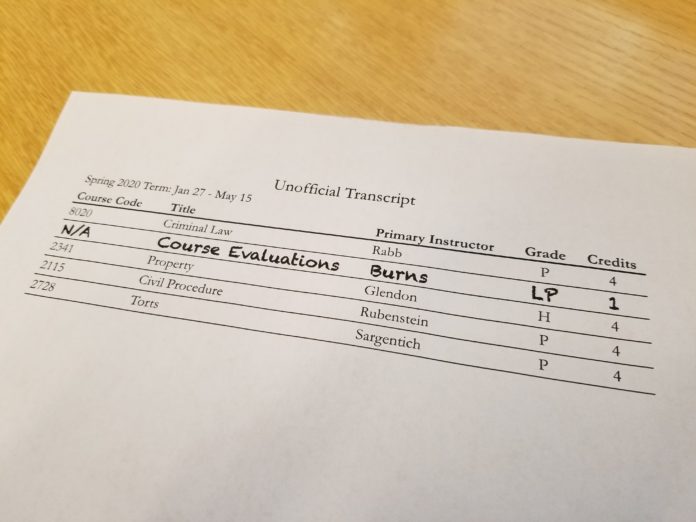Students of Harvard Law School, we ask that you fill out course evaluations with just as little feedback as you receive in your courses—a single letter grade. You may also explain why you are protesting with the following:
Feedback is essential to learning. The grade I have indicated is reciprocal to the level of feedback I will receive for this course. The administration should facilitate consistent feedback to students to meet its goals as a learning institution.
* * *
Lisa Burns has emailed us again. Fall grades are out. HLS grades evoke a range of emotions, but one of the most common emotions is confusion. An H or a P reveals so little about your performance in class or on the final exam. A letter grade tells you nothing about the quality of your writing, your understanding of the law, or your ability to spot issues. We understand that grades probably don’t matter; as graduates of HLS, we will have many opportunities regardless of our grades. But our learning does matter. HLS is a learning institution after all, and feedback is an essential part of that. For many of us, law school is the first time we spend an entire semester without midterms, graded assignments, or comments on our performance. And yet we don’t receive any feedback, even on our final exam.
Ironically, the school recognizes how important feedback is and actively seeks it out. The Office of the Registrar demands that we provide detailed feedback on our professors’ performances. We are asked to provide written commentary on the course’s strengths and weaknesses, the professor’s engagement with students, preparation of the material, and overall effectiveness. This information is so valuable to the administration that the Office of the Registrar has implemented a new policy punishing students for not completing their course evaluations. This year, students who did not submit all of their course evaluations had their grades withheld a week after they had been made available to everyone else.
These policies are reasonable to the extent that they improve learning here at HLS. Yet the radical disparity between the feedback demanded of students and the feedback received by students is outrageous. In response to this inequity, we encourage students to submit their course evaluations with a single letter grade for the class. We suggest selecting “N/A” for all numbered ranking categories and putting the letter grade (LP, P, H, or H*) in the text boxes. Students may also wish to provide further explanation, for which we suggest copy and pasting:
Feedback is essential to learning. The grade I have indicated is reciprocal to the level of feedback I will receive for this course. The administration should facilitate consistent feedback to students to meet its goals as a learning institution.
Our hope is that if enough students protest course evaluations in this manner, the administration will feel pressured to reconcile this imbalance of feedback.
It is true that professors are available to discuss exams after grades are released. But they are often very busy, making it hard to schedule a time to meet. In our experience, this feedback is often too vague to be helpful because so much time has elapsed since the professor graded the exam. Further, it is often uncomfortable to get in-person feedback, particularly for students with social anxiety, because grades can be an emotionally-charged topic. These are all obstacles students face to receiving the kind of feedback that professors receive automatically.
We are not looking for feedback throughout the semester. We’re not asking for professors to provide midterms or to comment on our cold calls mid-class. Nor are we asking for more transparency in the grading system or adjustments to the curve; we understand grading is a difficult and subjective process. But we do see a missed learning opportunity and are simply asking for some form of consistent, institutionalized feedback at the end of the semester that tells us more about our performance than a single letter grade. For example, a simple markup of our exam with Xs and checks would tell us where we may have misunderstood the law or made a sound argument. Alternatively, a short paragraph outlining the strengths and weaknesses of our arguments would indicate how persuasively we conveyed our understanding of the law. Or even a rubric like the one we fill out for course evaluations could flag areas for improvement across various categories related to our legal skills. Finally, if facilitating such feedback would place too high a burden on the school, in the spirit of fairness, we would be content with eliminating course evaluations altogether. We can get course evaluations and professor reviews from HLS Intel anyways.
In the meantime, we ask that students give what they receive. It is only fair that the administration receives evaluations as helpful for meaningful learning and improvement as those we find on our transcripts.


